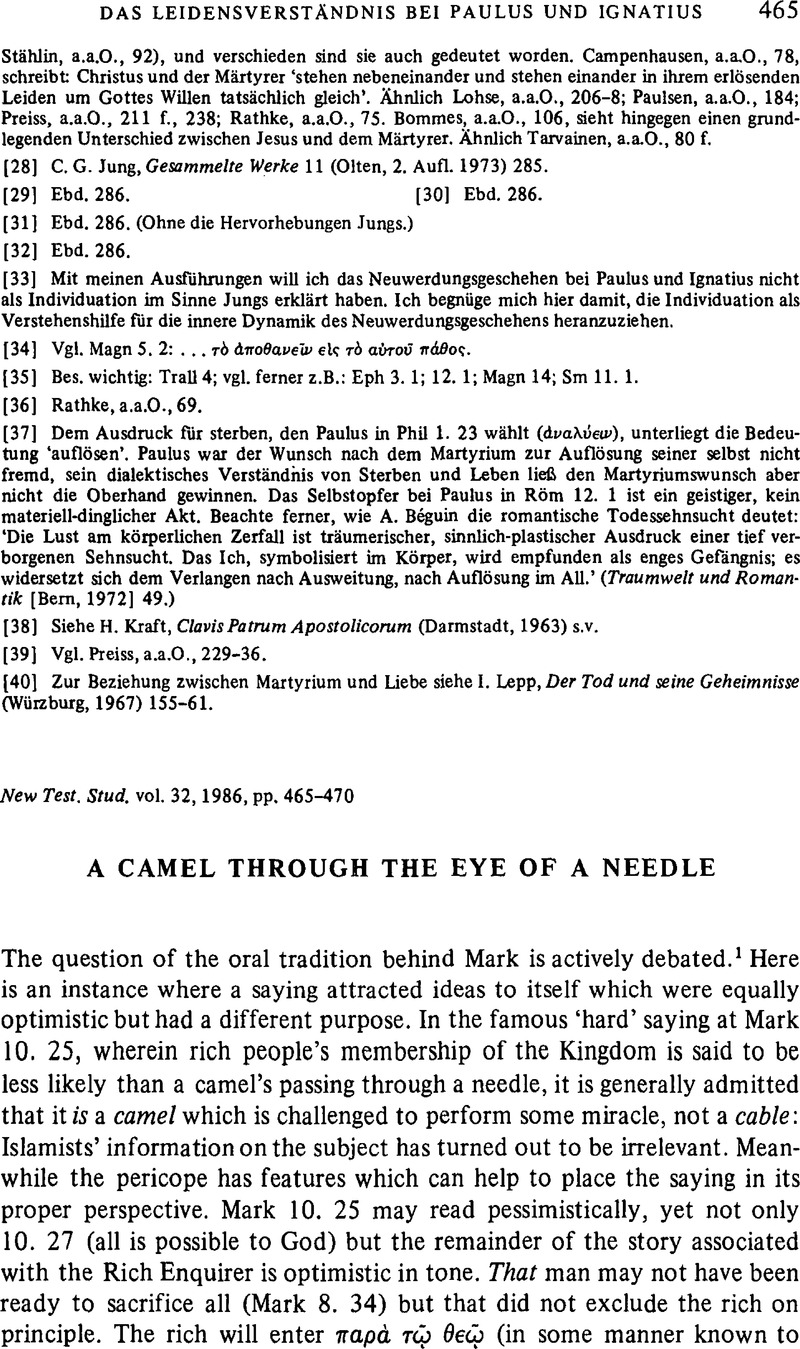Article contents
A Camel Through the Eye of a Needle
Published online by Cambridge University Press: 05 February 2009
Abstract

- Type
- Short Studies
- Information
- Copyright
- Copyright © Cambridge University Press 1986
References
[1] Kelber, Werner H., The Oral and the Written Gospel (Philadelphia, 1983).Google Scholar
[2] άφιέναι can cover enforced abandonment: Liddell-Scott-Jones, Lexicon, s.v. I. 3. But if ‘with harassments’ really implied, in Jesus’ mouth, the stance of Lamentations, voluntary ‘leaving’ would be quite in order.
[3] Mark 14.7, Acts 20. 35, Phil 4. 17. Tos., Peah IV. 19.
[4] b.Šabb. 104a = Soncino trans., 500.
[5] b.Sôtâ 13b, Ket. 67a, etc.
[6] b. Ber. 55b = Sonc. 342, B.M. 38b = Sonc. 233. Which Palestinian rabbis had seen an elephant?
[7] Mishnah, B.B. 11.4. Cf. b.Gitt.7a = Sonc. 24 (an unshorn lamb drowns).
[8] Is 60. 6 LXX. (Gospel is a benevolence as 61. 1–2) and is recompensed as such (Is 40. 9–10) (cf. Rev 22. 12).
[9] Is 11. 8 reading gāmāl for the MT gāmûl and me'orôt for me' ûrat (see versions).
[10] hûrāh šel mahat (Cant. R. V. 2). A metaphor for a tiny opening or opportunity (ibid.).
[11] Reward: Ps 18. 21, 103. 10. Recompense: 2 Sam 19. 37, Joel 4. 4. Requiting: Gen 50. 15; Deut 32. 6; 1 Sam 24. 17; Ps 7. 5, 137. 8; Is 3. 9; Lam 3. 64. Doing good: Ps 13. 6, 116. 7–8; Prov 11. 17, 31. 12; Is 63. 7 (râv tôv). Treatment: 2 Chr 20. 11; Prov 3. 30. Bounty: Ps 142. 8.
[12] b.Ket. 8b = Sonc. 40 (a most valuable piece of sustained punning). The gímel section of Ps 119 begins gemol, ‘deal bountifully’.
[13] Or μετά εὺτελείας as at Thuc. 2. 40.
[14] The ‘pursued’ are ha-nirdafîm. The root rdf is exactly διώκω (pursue). The ‘pursued’ do not complain, except to God, and accept their ill-treatment as a penance. Paquda, Bahya ibn Yosef ibn, Duties of the Heart (ed., trans., Hyamson, , Jerusalem, , 1970), X. 7, p. 375Google Scholar; cf. VI.7, p. 105. Maimonides, Code (Yad) I, II, v, 13 (54b). Note the position at b. B.Q. 93a: punishment is first meted out to him that cries out for divine intervention, and afterwards to him against whom he cries out!
[15] Matt 3. 2, 8, 11, 4. 17, 11. 21, 12. 41; Mark 1. 4, 15, 2. 17, 5. 12; Luke 13. 3, 5, 15. 7, 10, 16. 30; Acts 2. 38, 3. 19, 17. 30.
[16] Derrett, , Studies in the New Testament III (Leiden, 1982) 215–29. Exod. R. XLVI.Google Scholar
[17] It is known, and repeatedly confirmed, that individual Lucianic readings can be of very great age. Kahle, P. E., The Cairo Geniza (Oxford, 1959) 228–35.Google Scholar
[18] See further Derrett, , ‘Taking up the Cross and turning the cheek’, Alternative Approaches to New Testament Study ed. Harvey, A. E. (London: SPCK, 1985) 61–78.Google Scholar
- 1
- Cited by


